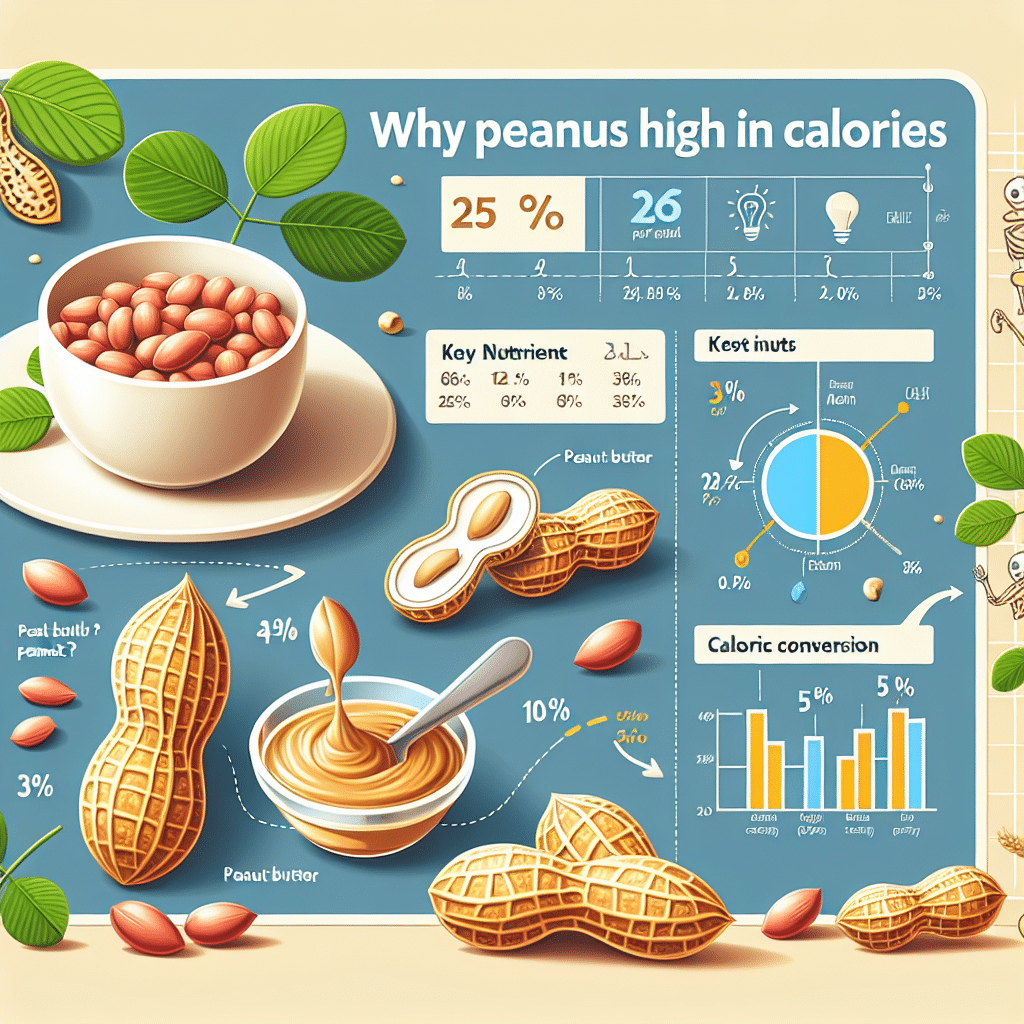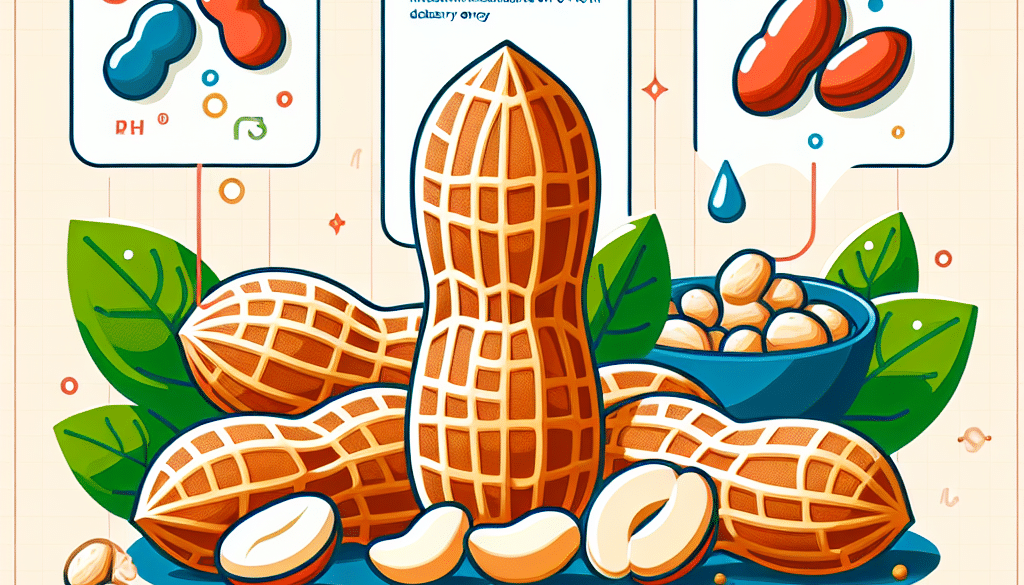Why Are Peanuts So High In Calories?
-
Table of Contents
- Peanuts: A Nutrient-Dense Snack with High Caloric Content
- Understanding the Caloric Density of Peanuts
- The Role of Fats in Peanut’s Caloric Profile
- Protein: A Key Nutrient in Peanuts
- Carbohydrates and Fiber: The Unsung Heroes
- Case Studies and Statistics: Peanuts in the Diet
- Conclusion: Balancing Calories and Nutrition
- Enhance Your Diet with ETprotein’s High-Quality Protein Products
Peanuts: A Nutrient-Dense Snack with High Caloric Content

Peanuts are a popular snack enjoyed by millions around the world. Not only are they delicious, but they also offer a variety of health benefits due to their nutrient-rich profile. However, one notable characteristic of peanuts is their high caloric content. This article delves into the reasons behind the high calorie count in peanuts and explores the implications for those who include them in their diet.
Understanding the Caloric Density of Peanuts
Peanuts are considered a calorie-dense food, meaning they have a high number of calories relative to their weight. This is largely due to their macronutrient composition, which includes a significant amount of fats, proteins, and carbohydrates.
- Fats: Peanuts are rich in fats, particularly monounsaturated and polyunsaturated fats, which are known for their heart-healthy benefits. Fats are the most calorie-dense macronutrient, providing 9 calories per gram.
- Proteins: Peanuts also contain a considerable amount of protein, which is essential for building and repairing tissues in the body. Protein provides 4 calories per gram.
- Carbohydrates: While not as abundant as fats and proteins, peanuts do contain carbohydrates, including dietary fiber. Carbohydrates also provide 4 calories per gram.
The combination of these macronutrients contributes to the overall caloric content of peanuts. Additionally, the presence of essential vitamins and minerals adds to their nutritional value, making them a well-rounded food choice despite their calorie count.
The Role of Fats in Peanut’s Caloric Profile
The high fat content in peanuts is the primary contributor to their caloric density. Peanuts contain a variety of fats, including oleic acid, linoleic acid, and palmitic acid. These fats are not only a source of energy but also play a crucial role in maintaining cell structure and hormone production.
While the calorie content from fat may seem concerning, it’s important to note that the types of fats found in peanuts are largely beneficial. Studies have shown that monounsaturated and polyunsaturated fats can help reduce bad cholesterol levels and lower the risk of heart disease when consumed in moderation.
Protein: A Key Nutrient in Peanuts
Peanuts are an excellent source of plant-based protein, making them a great option for vegetarians and vegans looking to increase their protein intake. The protein in peanuts contributes to their caloric content but also provides several health benefits, including:
- Muscle growth and repair
- Increased satiety, which can aid in weight management
- Improved metabolism
Protein is a vital component of a balanced diet, and peanuts offer a convenient and tasty way to include more protein in your meals and snacks.
Carbohydrates and Fiber: The Unsung Heroes
Although peanuts are not as high in carbohydrates as other snack foods, they do contain a notable amount of fiber. Dietary fiber is essential for digestive health and can help prevent constipation. It also plays a role in regulating blood sugar levels and cholesterol.
The fiber content in peanuts contributes to their overall calorie count but is also a key factor in the feeling of fullness after consumption. This can be particularly beneficial for those looking to control their appetite and manage their weight.
Case Studies and Statistics: Peanuts in the Diet
Several studies have examined the impact of including peanuts in the diet. For instance, research has shown that despite their high calorie content, peanuts do not necessarily contribute to weight gain when eaten in moderation. This is partly due to their ability to promote satiety, which can reduce overall calorie intake.
Statistics also indicate that regular consumption of nuts, including peanuts, is associated with a lower risk of developing certain chronic diseases, such as cardiovascular disease and type 2 diabetes. This suggests that the health benefits of peanuts may outweigh the potential concerns related to their caloric density.
Conclusion: Balancing Calories and Nutrition
In conclusion, peanuts are high in calories primarily due to their fat and protein content. However, the types of fats present in peanuts are beneficial for heart health, and the protein and fiber they provide offer additional health advantages. When consumed in moderation as part of a balanced diet, peanuts can be a nutritious and satisfying snack.
The key takeaways from this article are:
- Peanuts are calorie-dense due to their high fat and protein content.
- The fats in peanuts are mostly heart-healthy monounsaturated and polyunsaturated fats.
- Peanuts are a good source of plant-based protein and dietary fiber.
- Moderate consumption of peanuts can be part of a healthy diet without leading to weight gain.
Enhance Your Diet with ETprotein’s High-Quality Protein Products
If you’re looking to incorporate more protein into your diet, consider ETprotein’s range of organic bulk vegan proteins. Their peanut protein is an excellent choice for those seeking a plant-based protein source that is both nutritious and flavorful. ETprotein’s products are non-GMO, allergen-free, and characterized by a neutral taste, making them a versatile addition to any meal or snack.
Whether you’re involved in sports nutrition, weight management, or simply looking for healthy dietary supplements, ETprotein has a protein solution for you. Their commitment to quality and customer satisfaction makes them a trusted supplier for your protein needs.
About ETprotein:
ETprotein, a reputable protein and L-(+)-Ergothioneine (EGT) Chinese factory manufacturer and supplier, is renowned for producing, stocking, exporting, and delivering the highest quality organic bulk vegan proteins and L-(+)-Ergothioneine. They include Organic rice protein, clear rice protein, pea protein, clear pea protein, watermelon seed protein, pumpkin seed protein, sunflower seed protein, mung bean protein, peanut protein, and L-(+)-Ergothioneine EGT Pharmaceutical grade, L-(+)-Ergothioneine EGT food grade, L-(+)-Ergothioneine EGT cosmetic grade, L-(+)-Ergothioneine EGT reference grade and L-(+)-Ergothioneine EGT standard. Their offerings, characterized by a neutral taste, non-GMO, allergen-free attributes, with L-(+)-Ergothioneine purity over 98%, 99%, cater to a diverse range of industries. They serve nutraceutical, pharmaceutical, cosmeceutical, veterinary, as well as food and beverage finished product distributors, traders, and manufacturers across Europe, USA, Canada, Australia, Thailand, Japan, Korea, Brazil, and Chile, among others.
ETprotein specialization includes exporting and delivering tailor-made protein powder and finished nutritional supplements. Their extensive product range covers sectors like Food and Beverage, Sports Nutrition, Weight Management, Dietary Supplements, Health and Wellness Products, and Infant Formula, ensuring comprehensive solutions to meet all your protein needs.
As a trusted company by leading global food and beverage brands and Fortune 500 companies, ETprotein reinforces China’s reputation in the global arena. For more information or to sample their products, please contact them and email sales(at)ETprotein.com today.












